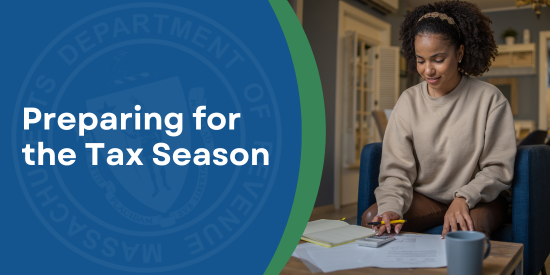- Massachusetts Department of Revenue

Tax season can be easier with the correct information. As you prepare to file your taxes, here are some current updates and changes to keep in mind.
Filing Season Video
The Filing Season video includes the following:
- 0:11: Introduction: Sharen Brown
- 3:14: Recent Legislative Changes and DOR Initiatives: Mireille Eastman
- 8:08: Recent Legislative Changes and DOR Initiatives: Finn Allen
- 12:48: Recent Legislative Changes and DOR Initiatives: Krystle Lyles
- 15:22: What's new on 2024 Forms & Schedules: Dannielle Colwell
- 19:00: Helpful Hints: Michelle McLeod
- 23:26: Updates to Popular Credits: Darryl Jenkins
- 27:37: How to Stay Informed and Contact DOR: Mireille Eastman
The Resources (PDF) is an A-Z guide for your tax filing and informational needs.
Free E-Filing Options
The deadline for filing state income and fiduciary tax returns for Massachusetts taxpayers is April 15, 2025.
Below are your E-file options, including free offers:
- Complete your Federal and State Returns for Free with Direct File if You Qualify
- File Your State Return Only with MassTaxConnect for Free if You Qualify
- Other Free File Options for Qualified Taxpayers
- E-file with Approved Tax Software
2024 Personal Income and Corporate Excise Tax Law Changes
2024 Personal Income Tax Rates
- The tax rate on most classes of taxable income is 5%.
- The tax rate on long-term gains from the sale or exchange of collectibles is 12% (subject to a 50% deduction).
- For tax years beginning on or after January 1, 2023, the tax rate on short-term gains from the sale or exchange of capital assets is 8.5%.
Learn more:
- Tax Year 2024 Personal Income (Chapter 62) Changes
- Tax Year 2024 Corporate Excise (Chapter 63) Changes
- Massachusetts Tax Rates
- Differences Between MA and Federal Tax Law for Personal Income
4% Surtax
Starting with tax year 2023, personal income taxpayers must pay an additional 4% (4% surtax) on taxable income over $1,000,000, increased annually for inflation (surtax threshold).
For the 2024 tax year, the threshold is $1,053,750.
Learn more:
- TIR 23-12: Provisions in the Fiscal Year 2024 Budget Pertaining to the 4% Surtax and the Extension of the Brownfields Tax Credit
- 4% Surtax FAQs
Changes to Massachusetts joint filing requirements
For tax years beginning on or after January 1, 2024, married couples must file a joint personal income tax return for any year they file a joint federal income tax return unless an exception applies.
Learn more:
- TIR 24-4: Provisions in the 2023 Tax Relief Legislation
- 830 CMR 62.5A.1: Non-Resident Income Tax
Repeal of the Deduction of Interest from Massachusetts banks
Effective for taxable years beginning on or after January 1, 2024, the deduction previously allowed for a deduction of up to $100 ($200 for joint filers) of interest from Massachusetts banks is repealed.
Learn more:
- Exemption of Interest on Savings in Massachusetts Banks
- Directive 86-38: Massachusetts Bank Interest Term And Time Deposits, $100,000 Limitation
Employer-Provided Parking, Transit Pass, and Commuter Highway Vehicle Benefits Exclusion Amounts
Massachusetts conforms to the federal income exclusion for employer-provided parking, transit pass, and commuter highway vehicle transportation benefits.
The IRS has determined that the 2024 inflation-adjusted monthly exclusion amounts are:
- $315 for employer-provided parking and
- $315 for combined transit pass and commuter highway vehicle transportation benefits.
Annual Update of Circuit Breaker Tax Credit for Seniors
Taxpayers aged 65 or older who own or rent residential property located in Massachusetts are allowed a credit equal to the amount by which their total real estate tax payments, or 25% of their rent in the case of a renter, exceed 10% of the taxpayer’s total income.
The credit cannot exceed a certain maximum amount, which is determined by multiplying a statutory base amount by a cost-of-living adjustment for the calendar year in which the taxable year begins.
The maximum credit for tax year 2024 is $2,730.
The credit amount is subject to limitations based on the:
- taxpayer’s total income and
- assessed value of the real estate, which for tax year 2024 must not exceed $1,172,000.
To calculate the credit, the total income and maximum credit thresholds are adjusted annually for inflation.
For tax year 2024, an eligible taxpayer’s total income cannot exceed:
- $72,000 in the case of a single filer who is not a head of household filer
- $91,000 in the case of a head of household filer and
- $109,000 in the case of a joint filer.
To qualify for the credit, a taxpayer must:
- be age 65 or older and
- occupy the property as his or her principal residence.
Learn more:
- Massachusetts Senior Circuit Breaker Tax Credit
- Video: An Introduction to Circuit Breaker Tax Credit
- Video: Circuit Breaker Tax Credit Tutorial
- Tax Tips for Seniors and Retirees
E-file:
Child and Family Tax Credit
Effective for taxable years beginning on or after January 1, 2024, the refundable, non-transferable child and family tax credit (“CFTC”) for taxpayers who maintain a household that includes certain individuals increases from $310 to $440 for each such individual, with no limit to the number of such individuals that may qualify for the credit.
In addition, starting with tax years beginning on or after January 1, 2024, a noncustodial parent may claim the credit for a dependent child who is:
- age 13 or older and
- physically or mentally incapable of caring for himself or herself.
Learn more:
- Massachusetts Child and Family Tax Credit
- Child and Family Tax Credit Flyer (English)
- Child and Family Tax Credit Flyer (Spanish)
- TIR 24-4: Provisions in the 2023 Tax Relief Legislation
- E-file and Pay Your MA Personal Income Taxes
E-file:
Massachusetts Earned Income Tax Credit (EITC)
The Massachusetts EITC amount an individual can claim has increased from 30% to 40% of the federal credit, effective for taxable years starting on or after January 1, 2023.
Learn more:
- Massachusetts EITC: Overview and Eligibility
- TIR 24-4: Provisions in the 2023 Tax Relief Legislation
E-file:
Temporary Authorized Training Tax Credit for Emergency Assistance
A new credit takes effect for tax years beginning on or after January 1, 2024. The credit is available to businesses that provide training to individuals receiving benefits through the Massachusetts Emergency Housing Assistance program.
The credit is:
- equal to $2,500 for each such employee and
- temporary.
It is available only for tax years, during which the emergency housing assistance program is subject to capacity limitations.
The credit is no longer available as of January 1, 2026.
Learn more:
- TIR 24-7: Temporary Authorized Training Tax Credit for Emergency Assistance
Qualified Veterans Hire Tax Credit
For tax years beginning on or after January 1, 2024, the qualified veterans hire tax credit for qualified employers that hire eligible veterans increases from $2,000 to $2,500.
Learn more:
- TIR 24-15, Tax Provisions in An Act Honoring, Empowering, and Recognizing Our Servicemembers and Veterans
Keep Informed
Bookmark Us
For more news and tax filing help, you can bookmark X (Formerly Twitter).
You can also learn to translate a website, webpage, or document into your language.
Prior DOR News issues
If you missed a prior edition, visit DOR News. There’s also DOR's Tax Professionals page for more information.

